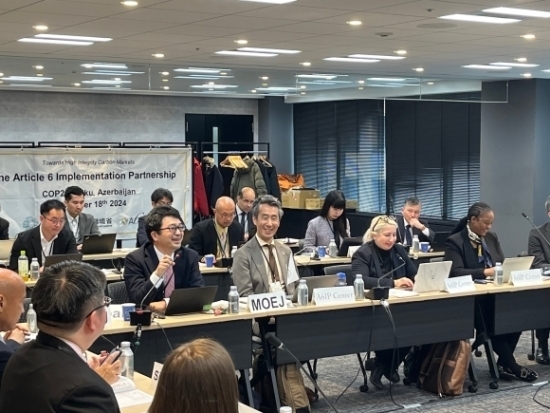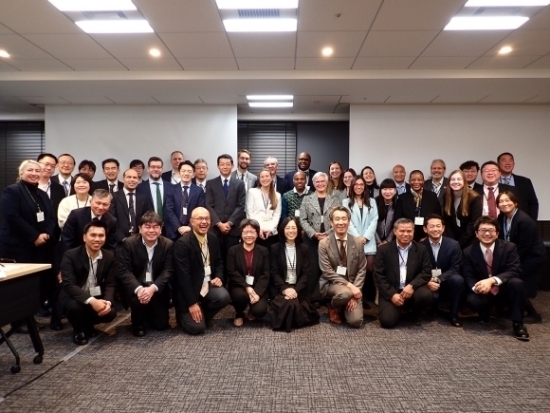Press Release
March 28, 2025
- Global Environment
Second Advisory Group Meeting of Paris Agreement Article 6 Implementation Partnership (A6IP)
1. The Paris Agreement Article 6 Implementation Partnership (A6IP) Center convened its second Advisory Group Meeting from March 11 to 12, 2025.
2. The Advisory Group meeting brought together government officials, international organizations, and private sector representatives involved in the implementation of Article 6 of the Paris Agreement. Discussions focused on reviewing the current status of Article 6 implementation (emission reduction and removal projects and their potential), sharing best practices and experiences of carbon projects in project development and implementation, and considering challenges and future directions for private sector project development and implementation. The participants also discussed issues and future directions in project development and implementation under Article 6, as well as the requirements for utilizing the Independent Crediting Standard in line with the Article 6 guidance. Furthermore, the meeting included discussions on the A6IP activities for FY2025 and the A6IP’s proposed mid- to long-term plan for the period from 2030 to 2050.
3. The Ministry of the Environment (MOE), Japan will continue to strive for completing the Joint Crediting Mechanism (JCM) system and framework, while also working to further expand and accelerate specific projects and to promote the implementation of Article 6 initiatives in countries around the world through the A6IP.
1. Participating countries and organizations
Canada, Commonwealth of Australia, Commonwealth of the Bahamas, Republic of Chile, French Republic, Federal Republic of Germany, Italian Republic, Republic of India, Republic of Indonesia, Kingdom of Norway, New Zealand, Republic of Singapore, Kingdom of Sweden, Kingdom of Thailand, United Kingdom, Asian Development Bank (ADB), European Bank for Reconstruction and Development (EBRD), Climate Action Data Trust (CAD-TRUST), Global Green Growth Institute (GGGI), Organisation for Economic Co-operation and Development (OECD), Inter-American Development Bank (IDB), IETA, United Nations Development Programme (UNDP), UNEP Copenhagen Climate Center (UNEP-CCC), United Nations Framework Convention on Climate Change (UNFCCC) Secretariat, United Nations University Institute for the Advanced Study of Sustainability (UNU-IAS), World Bank, The European Roundtable on Climate Change and Sustainable Transition (ERCST), The Integrity Council for the Voluntary Carbon Market (ICVCM), Voluntary Carbon Markets Integrity Initiative (VCMI), Global Environment Centre (GEC), The Institute of Energy Economics (IEE), Japan, Gold Standard, Ministry of the Environment (MOE), Japan, Paris Agreement Article 6 Implementation Partnership (A6IP) Center
2. Summary of the meeting
(1) Session 1: Global Status of Paris Agreement Article 6 Implementation, Projects, and its Potential
The A6IP Center presented the current status of Article 6 implementation drawing from the "Paris Agreement Article 6 Implementation Status Report" launched by the Center last November, and facilitated discussions on future possibilities and challenges. While there is significant interest in implementing Article 6, the implementation of tangible projects remains limited. Participants confirmed the need to harmonize diverse approaches, standards, methodologies, and the measurement, reporting and verification (MRV) systems. They also stressed the importance of sharing practical project experiences and encouraging greater private-sector involvement to meet the future demand for credits.
MOE Japan made a presentation on the need to adapt the JCM into a more streamlined mechanism without compromising environmental integrity and emphasized the importance of further expanding and accelerating project development.
(2) Session 2: Article 6 Project Development Success Stories and Business Matching Experiences
Private sector representatives shared success stories from projects generating credits through methane emission reductions and emission reductions in the transportation sector. Key success factors included stakeholder commitment, clear guidelines, transparent systems, and experiential learning. However, challenges, such as financing, regulatory complexity and susceptibility to intergovernmental negotiations, were also noted.
(3) Session 3: Promoting high integrity and use of independent crediting programs for Article 6
The A6IP Center gave a presentation on the "Principles of High Integrity Carbon Markets" adopted in the communiqué of the G7 Ministers’ Meeting on Climate, Energy and Environment in Sapporo, organized in April 2023. The Center highlighted the need to promote the use of voluntary/ independent credit mechanism and to support their reporting to implement Article 6.
(4) Session 4: Challenges and possible approaches to promote Article 6 project formulation and strengthen Article 6 implementation
The A6IP Center reported on the capacity-building activities aimed at promoting the implementation of Article 6 as well as issues identified in the Article 6 Implementation Status Report. Discussions were made on potential avenues for addressing these issues through A6IP's activities. The discussions highlighted the following:
● The importance of accumulating not only knowledge on Article 6, but also resources and know-how on experiences gained from the Clean Development Mechanism (CDM) under the Kyoto Protocol and the JCM
● Sharing experiences and promoting dialogue among various stakeholders by consolidating and disseminating information on good practices, including case studies and lessons learned
● Consideration of measures to leverage climate finance to support the implementation of Article 6
(5) Session 5: A6IP's activities for 2025 and Mid- and Long-term Plans
The A6IP Center presented the draft activity plan for FY2025 and the Mid- and Long-term plan, with a focus on project development and implementation aligned with Article 6. Participants expressed various opinions regarding the challenges that each A6IP partner and the A6IP Center should address toward achieving net zero and the goals of their activities.




3. Article 6 of the Paris Agreement and JCM
(1) The Paris Agreement requires Parties to prepare Nationally Determined Contributions (NDCs) for the global response to climate change. Meanwhile, in order to effectively promote the reduction and removal of global greenhouse gases emissions, Article 6 of the Paris Agreement stipulates a cooperative framework for reducing emissions and increasing removal through international cooperation, and for transferring the outcomes of such measures internationally. It is expected that the implementation of Article 6 of the Paris Agreement will promote the carbon market and private investment, and contribute to further mitigation in global greenhouse gas emissions as well as sustainable development.
The Paris Agreement:
https://unfccc.int/sites/default/files/english_paris_agreement.pdf
More information on Article 6:
http://carbon-markets.env.go.jp/eng/mkt-mech/climate/paris.html
(2) Japan has implemented an initiative called the Joint Crediting Mechanism (JCM), which is aligned with Article 6 of the Paris Agreement. The JCM is a mechanism in which Japanese companies and the Government of Japan cooperate with partner countries in the Global South and other areas in terms of technology and funding to implement measures, and the additional greenhouse gas reduction and removal outcomes are evaluated in a quantitative manner in line with Article 6 of the Paris Agreement and shared between the partner country and Japan.
It is expected to contribute to the NDCs of both Japan and partner countries, and to revitalize the economies of both countries through the participation of private companies. Furthermore, it is also expected to contribute to sustainable development in partner countries by solving various social, economic and environmental issues.
Since the first JCM agreement was signed with Mongolia in 2013, JCM agreements have been established with 29 countries* to date, and more than 250 projects are currently underway.
*Mongolia, People's Republic of Bangladesh, Federal Democratic Republic of Ethiopia, Republic of Kenya, Republic of Maldives, Socialist Republic of Vietnam, Lao People's Democratic Republic, Republic of Indonesia, Republic of Costa Rica, Republic of Palau, Kingdom of Cambodia, United Mexican States, Kingdom of Saudi Arabia, Republic of Chile, Republic of the Union of Myanmar, Kingdom of Thailand, Republic of the Philippines, Republic of Senegal, Republic of Tunisia, Republic of Azerbaijan, Republic of Moldova, Georgia, Democratic Socialist Republic of Sri Lanka, Republic of Uzbekistan, Independent State of Papua New Guinea, United Arab Emirates, Kyrgyz Republic, Republic of Kazakhstan, and Ukraine. In total, 29 countries.
(3) About Paris Agreement Article 6 Implementation Partnership
The “Paris Agreement Article 6 Implementation Partnership (A6IP)” is a partnership launched by MOE Japan, in 2022 at COP27 to support capacity building related to Article 6 of the Paris Agreement. On the occasion of the G7 Ministers' Meeting on Climate, Energy and Environment in Sapporo in April 2023, the “A6IP Centre” was established at the Institute for Global Environmental Strategies (IGES) to serve as the secretariat to promote the activities of the partnership, and MOE Japan is providing operating funds. At present, 86 countries and over 200 organizations and companies have been participating in the partnership (as of the end of February 2025).
・Publication of “Article 6 Implementation Status Report” by the A6IP Center (press release on November 18, 2024):
https://www.env.go.jp/en/press/press_03513.html
The Paris Agreement:
https://unfccc.int/sites/default/files/english_paris_agreement.pdf
More information on Article 6:
http://carbon-markets.env.go.jp/eng/mkt-mech/climate/paris.html
(2) Japan has implemented an initiative called the Joint Crediting Mechanism (JCM), which is aligned with Article 6 of the Paris Agreement. The JCM is a mechanism in which Japanese companies and the Government of Japan cooperate with partner countries in the Global South and other areas in terms of technology and funding to implement measures, and the additional greenhouse gas reduction and removal outcomes are evaluated in a quantitative manner in line with Article 6 of the Paris Agreement and shared between the partner country and Japan.
It is expected to contribute to the NDCs of both Japan and partner countries, and to revitalize the economies of both countries through the participation of private companies. Furthermore, it is also expected to contribute to sustainable development in partner countries by solving various social, economic and environmental issues.
Since the first JCM agreement was signed with Mongolia in 2013, JCM agreements have been established with 29 countries* to date, and more than 250 projects are currently underway.
*Mongolia, People's Republic of Bangladesh, Federal Democratic Republic of Ethiopia, Republic of Kenya, Republic of Maldives, Socialist Republic of Vietnam, Lao People's Democratic Republic, Republic of Indonesia, Republic of Costa Rica, Republic of Palau, Kingdom of Cambodia, United Mexican States, Kingdom of Saudi Arabia, Republic of Chile, Republic of the Union of Myanmar, Kingdom of Thailand, Republic of the Philippines, Republic of Senegal, Republic of Tunisia, Republic of Azerbaijan, Republic of Moldova, Georgia, Democratic Socialist Republic of Sri Lanka, Republic of Uzbekistan, Independent State of Papua New Guinea, United Arab Emirates, Kyrgyz Republic, Republic of Kazakhstan, and Ukraine. In total, 29 countries.
(3) About Paris Agreement Article 6 Implementation Partnership
The “Paris Agreement Article 6 Implementation Partnership (A6IP)” is a partnership launched by MOE Japan, in 2022 at COP27 to support capacity building related to Article 6 of the Paris Agreement. On the occasion of the G7 Ministers' Meeting on Climate, Energy and Environment in Sapporo in April 2023, the “A6IP Centre” was established at the Institute for Global Environmental Strategies (IGES) to serve as the secretariat to promote the activities of the partnership, and MOE Japan is providing operating funds. At present, 86 countries and over 200 organizations and companies have been participating in the partnership (as of the end of February 2025).
・Publication of “Article 6 Implementation Status Report” by the A6IP Center (press release on November 18, 2024):
https://www.env.go.jp/en/press/press_03513.html
| Contact Office for the Joint Crediting Mechanism and International Carbon Market, Global Environment Bureau, Ministry of the Environment, Japan Tel: +81-3-5521-8246 E-mail: jcm-contact@env.go.jp |
